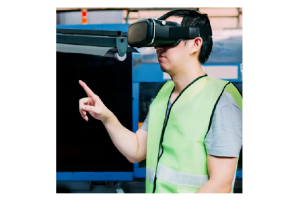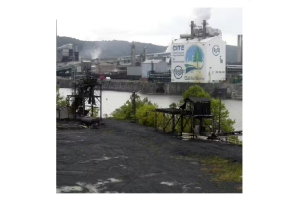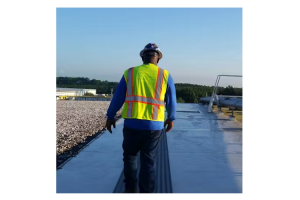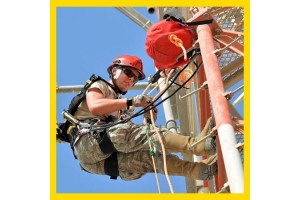Currency
August 03, 2019
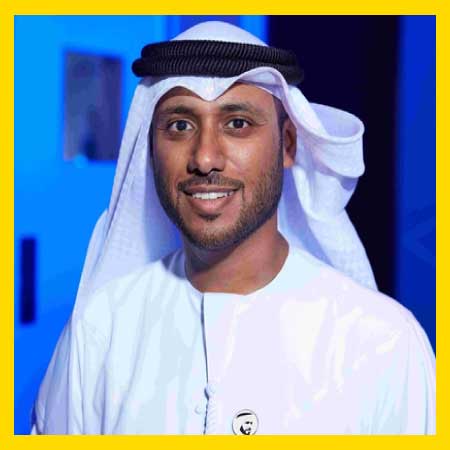
UAE engineering giant's CEO opens up on nationalisation, expansion outside the UAE, and foray into renewable energy. “We cannot focus on the model that we are used to, because the industry is changing, and we have to adapt.”
Much like the country in which it is based, the UAE’s National Petroleum Construction Company (NPCC) likes to think big: its Abu Dhabi fabrication yard is the largest in the Middle East and North Africa, at 1.3km2. Within that yard, it recently launched the largest oilfield platform in the UAE as part of its work for the Abu Dhabi National Oil Company’s (Adnoc) Umm Lulu field.
At the launch event for the project, banners hung off of the 32,000-tonne platform, a maze of interconnected pipes and facilities. The banners boasted that the platform was made in the UAE, for the UAE.
The nation’s In-Country Value (ICV) initiative is pushing companies who hope to do business in the UAE to use local vendors, suppliers and talent as a boost to the local supply chain and oil and gas ecosystem. As such, NPCC’s chief executive officer, Ahmed Al Dhaheri, considers the local construction of a platform – which is equivalent in weight to three Eiffel Towers – a key milestone for the company.
“This platform marks a new era for NPCC,” Al Dhaheri tells Oil & Gas Middle East, a sister title of Construction Week.
“It really shows the capabilities and competencies of UAE companies, and how we are able to provide total solutions to the oil and gas sector.
“It was an excellent opportunity to develop a large pool of our UAE talent, many of whom led different teams during the execution of the project,” he adds.
The platform is just the latest part of NPCC’s work on Adnoc’s Umm Lulu Package 2 Full Field Development Project, the total value of which Al Dhaheri estimates at more than $2.5bn – but he also sees potential outside of the UAE’s borders.
“Last year was a remarkable year for the company – we achieved around 85% of the total value of our projects from outside of the UAE,” he says.
This includes a $231m onshore project it won in October 2018 from Kuwait Oil Company, a country in which the company has been inactive for several years. NPCC has also signed a contract with India’s ONGC and two memorandums of understanding (MoU) with Egypt’s Petrojet and offshore engineering, procurement, and construction (EPC) company PMS.

“These MoUs are helping us to understand the potential projects and prospects in Egypt, and we are already succeeding,” he says.
“Maybe the [subsea] project we won in the Red Sea is small, but this is the best way to understand the climate of this market.”
Concurrently, NPCC saw a 27% increase in operating profit in 2018, up from $190m to $242m, which Al Dhaheri attributes to the company’s regional expansion. But this strategy has its complications.
“If we look at the project we are executing in Kuwait, local content is around 30%, so we need to utilise more local suppliers, more subcontractors, we need to develop Kuwaitis,” Al Dhaheri says. “All of these are challenges that any EPC company would have to face.”
Every company in the oil and gas sector has to take into consideration different localisation requirements across the region. Despite the fact that NPCC already has two engineering centres in India, Al Dhaheri says that the company will have to do more than just that in the Asian country. “I believe that you always need to be agile, especially if you are operating in different markets, because there are new requirements being introduced by national and international oil companies.”
In Saudi Arabia, as part of Saudi Aramco’s Long-Term Agreement, which hastens the bidding process for its partners, with a focus on offshore brownfield projects, NPCC has won 10 contracts worth a combined $2bn. It signed an agreement with Saudi Aramco in October 2018 to establish a 50ha integrated fabrication yard worth $42m in Ras Al Khair. Simply being successful in its Abu Dhabi headquarters is no longer sufficient.
“Yes, we have the largest fabrication yard here in Abu Dhabi, but in order to have sustainable operations with Aramco, we need to establish another yard in Saudi Arabia,” he says.
“We are well-positioned for ICV, but when it comes to operating in other countries, like Saudi Arabia which has Iktva [In-Kingdom Total Value Add programme], to maintain or strengthen our position there we need to do things differently.”
That includes investing in technology. As the company looks towards North Africa and Southeast Asia, it will have to face deepsea projects. Al Dhaheri notes that this is why the company has invested heavily in offshore assets that can lay pipes as deep as 2000m.
But he has not overlooked digital technology – NPCC has partnered with industrial software specialist Aveva and is entering into an agreement with Microsoft Dynamics to work on digital transformation in the back-office. For a company with complex operations, including its engineering and supply chain management, this could mean savings.
“Today, it is all about managing every single activity efficiently, managing resources properly, and controlling costs,” he says.
To Al Dhaheri, growth means more than localising and digitalising assets and operations; he ultimately wants NPCC to transform into an EPC major across the energy industry, including both downstream and renewables in additional to its traditional focus on upstream projects.“When I look at the future of the company, we are planning to develop many sectors, many areas,” he says.
“We want to expand in downstream and to have a bigger share in executing onshore projects, and we are looking at renewable energy, especially offshore wind farms.”
Al Dhaheri says that NPCC has already acquired a minority stake in a French renewables company, and that the company is currently identifying potential engineering companies to acquire.
Although integration will be a large part of the company’s future, NPCC’s projects are primarily in the upstream offshore segment, with onshore projects taking around 10% of its total projects, which he wants to boost to 20%.
While he aims to continue expanding across the industry and geographies, he admits that in the short term, the company’s core markets will continue to generate of NPCC’s revenue. After all, shifting to an entirely new market segment will come with its own share of challenges.
“It requires a completely new mindset,” Al Dhaheri admits, noting that established players already exist in this market.
“Working out of our comfort zone is not going to be an easy journey, but with the resources we have, I believe that we can really penetrate this market.”
He is developing a dedicated team to focus on renewables, with a set of targets that differs from the rest of the company.
“We are embarking on a journey that will involve many challenges, but it will enable the company to grow to reach different heights, to enter new markets, and to develop new sectors,” Al Dhaheri says.
He believes that having the right strategy, in addition to the right resources, will enable the EPC company to maximise its share in the market, which he characterises as increasingly challenging and competitive.
Much like the country in which it is based, the UAE’s National Petroleum Construction Company (NPCC) likes to think big: its Abu Dhabi fabrication yard is the largest in the Middle East and North Africa, at 1.3km2. Within that yard, it recently launched the largest oilfield platform in the UAE as part of its work for the Abu Dhabi National Oil Company’s (Adnoc) Umm Lulu field.
At the launch event for the project, banners hung off of the 32,000-tonne platform, a maze of interconnected pipes and facilities. The banners boasted that the platform was made in the UAE, for the UAE.
The nation’s In-Country Value (ICV) initiative is pushing companies who hope to do business in the UAE to use local vendors, suppliers and talent as a boost to the local supply chain and oil and gas ecosystem. As such, NPCC’s chief executive officer, Ahmed Al Dhaheri, considers the local construction of a platform – which is equivalent in weight to three Eiffel Towers – a key milestone for the company.
“This platform marks a new era for NPCC,” Al Dhaheri tells Oil & Gas Middle East, a sister title of Construction Week.
“It really shows the capabilities and competencies of UAE companies, and how we are able to provide total solutions to the oil and gas sector.
“It was an excellent opportunity to develop a large pool of our UAE talent, many of whom led different teams during the execution of the project,” he adds.
The platform is just the latest part of NPCC’s work on Adnoc’s Umm Lulu Package 2 Full Field Development Project, the total value of which Al Dhaheri estimates at more than $2.5bn – but he also sees potential outside of the UAE’s borders.
“Last year was a remarkable year for the company – we achieved around 85% of the total value of our projects from outside of the UAE,” he says.
This includes a $231m onshore project it won in October 2018 from Kuwait Oil Company, a country in which the company has been inactive for several years. NPCC has also signed a contract with India’s ONGC and two memorandums of understanding (MoU) with Egypt’s Petrojet and offshore engineering, procurement, and construction (EPC) company PMS.

“These MoUs are helping us to understand the potential projects and prospects in Egypt, and we are already succeeding,” he says.
“Maybe the [subsea] project we won in the Red Sea is small, but this is the best way to understand the climate of this market.”
Concurrently, NPCC saw a 27% increase in operating profit in 2018, up from $190m to $242m, which Al Dhaheri attributes to the company’s regional expansion. But this strategy has its complications.
“If we look at the project we are executing in Kuwait, local content is around 30%, so we need to utilise more local suppliers, more subcontractors, we need to develop Kuwaitis,” Al Dhaheri says. “All of these are challenges that any EPC company would have to face.”
Every company in the oil and gas sector has to take into consideration different localisation requirements across the region. Despite the fact that NPCC already has two engineering centres in India, Al Dhaheri says that the company will have to do more than just that in the Asian country. “I believe that you always need to be agile, especially if you are operating in different markets, because there are new requirements being introduced by national and international oil companies.”
In Saudi Arabia, as part of Saudi Aramco’s Long-Term Agreement, which hastens the bidding process for its partners, with a focus on offshore brownfield projects, NPCC has won 10 contracts worth a combined $2bn. It signed an agreement with Saudi Aramco in October 2018 to establish a 50ha integrated fabrication yard worth $42m in Ras Al Khair. Simply being successful in its Abu Dhabi headquarters is no longer sufficient.
“Yes, we have the largest fabrication yard here in Abu Dhabi, but in order to have sustainable operations with Aramco, we need to establish another yard in Saudi Arabia,” he says.
“We are well-positioned for ICV, but when it comes to operating in other countries, like Saudi Arabia which has Iktva [In-Kingdom Total Value Add programme], to maintain or strengthen our position there we need to do things differently.”
That includes investing in technology. As the company looks towards North Africa and Southeast Asia, it will have to face deepsea projects. Al Dhaheri notes that this is why the company has invested heavily in offshore assets that can lay pipes as deep as 2000m.
But he has not overlooked digital technology – NPCC has partnered with industrial software specialist Aveva and is entering into an agreement with Microsoft Dynamics to work on digital transformation in the back-office. For a company with complex operations, including its engineering and supply chain management, this could mean savings.
“Today, it is all about managing every single activity efficiently, managing resources properly, and controlling costs,” he says.
To Al Dhaheri, growth means more than localising and digitalising assets and operations; he ultimately wants NPCC to transform into an EPC major across the energy industry, including both downstream and renewables in additional to its traditional focus on upstream projects.“When I look at the future of the company, we are planning to develop many sectors, many areas,” he says.
“We want to expand in downstream and to have a bigger share in executing onshore projects, and we are looking at renewable energy, especially offshore wind farms.”
Al Dhaheri says that NPCC has already acquired a minority stake in a French renewables company, and that the company is currently identifying potential engineering companies to acquire.
Although integration will be a large part of the company’s future, NPCC’s projects are primarily in the upstream offshore segment, with onshore projects taking around 10% of its total projects, which he wants to boost to 20%.
While he aims to continue expanding across the industry and geographies, he admits that in the short term, the company’s core markets will continue to generate of NPCC’s revenue. After all, shifting to an entirely new market segment will come with its own share of challenges.
“It requires a completely new mindset,” Al Dhaheri admits, noting that established players already exist in this market.
“Working out of our comfort zone is not going to be an easy journey, but with the resources we have, I believe that we can really penetrate this market.”
He is developing a dedicated team to focus on renewables, with a set of targets that differs from the rest of the company.
“We are embarking on a journey that will involve many challenges, but it will enable the company to grow to reach different heights, to enter new markets, and to develop new sectors,” Al Dhaheri says.
He believes that having the right strategy, in addition to the right resources, will enable the EPC company to maximise its share in the market, which he characterises as increasingly challenging and competitive.
